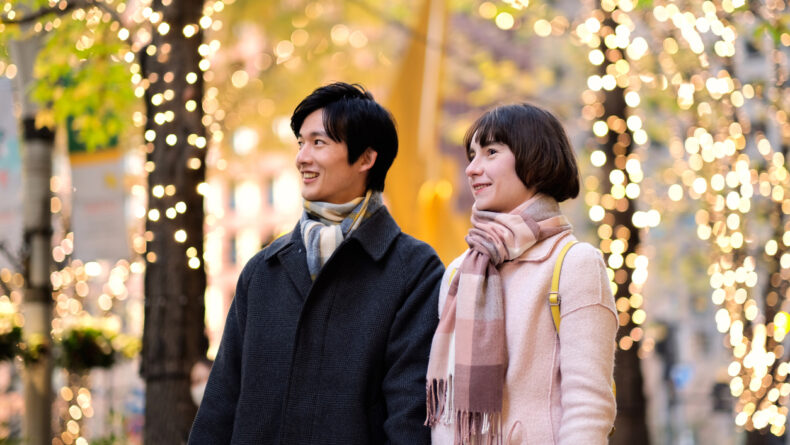Valentine’s Day Do’s & Don’ts In Japan
Tips On Navigating The Day Of Love
Let's focus on what you can do to keep yourself happy and in a good head space during these trying lovey-dovey times.
Valentine’s Day is an entirely different experience in Japan than it is overseas. For starters, February 14th is a day for women to confess their feelings or give chocolates and sweets to the men in their lives. It’s not traditionally a reciprocal holiday by any means, although in recent years, gyaku barentain (reverse Valentine), where men give gifts to their partners or gifts are exchanged between partners, has been picking up as a trendy international thing to do.
There are two main categories of goodies given for Valentine’s. In brief, honmei chocolates are serious ‘I’m interested in you’ treats, while giri chocolates are ones given out of obligation. A third category, tomo chocolates given between friends, is also on the rise. Click the following links for more details about celebrating Valentine’s Day in Japan, and answers to questions about Valentine’s Day that others received last year.
For a lot of women, Japanese and otherwise living in Japan, Valentine’s Day can be depressing. March 14th, White Day, isn’t much better—but more on that next month. For now, it will suffice to say that reality does not always live up to expectations.
Don’t Assume Everyone Will Celebrate Valentine’s Day
 © Photo by iStock: Sergey Dementyev
© Photo by iStock: Sergey DementyevAs with any other holiday, some people celebrate Valentine’s Day and some don’t. Some companies ban celebrating Valentine’s Day during office hours, or entirely. “It’s bad for morale” (French male, 29). “It’s a distraction and inappropriate to force romantic notions on an office setting” (Japanese male, 54).
Regardless of how you feel about the day, if you are at work, listen to what office culture dictates. The last thing you want is to be disciplined or fired over chocolates.
Do Give Valentine’s Chocolates to Those You Care About
 © Photo by iStock: ninitta
© Photo by iStock: ninittaIf your office encourages or permits people to celebrate Valentine’s Day, then by all means celebrate it. The options are endless in Japan at this time of year. “Plaza and Loft are my two favorite stores at this time of year. There’s so much candy to choose from!” (Japanese woman, 32).
You can gift special things to your friends and/or your crush, but be reasonable and fair in what you do. For example, if you work in a small office, bring something for everyone. In a larger one, maybe buying in bulk (Costco, Hands and Loft are good options) and putting a bowl of communal snacks in a common area is the best option.
However…
Don’t Leave People Out
 © Photo by iStock: Edwin Tan
© Photo by iStock: Edwin TanAs many learned in elementary school, if you aren’t bringing treats for the whole class, don’t bring any at all. This holds true in the case of giri chocolates. No one wants to feel singled out or ignored, especially not if everyone else is raking in the goodies.
Do Make Something Special For Your Partner/Crush
 © Photo by iStock: Vasil Dimitrov
© Photo by iStock: Vasil DimitrovIf you are in a relationship, then it makes sense to give your partner something special for Valentine’s Day. Even more so if it’s homemade and something that suits their tastes, as that’s considered a key part of Valentine’s Day in Japan.
If you are single but want to tell someone how you feel, then Valentine’s is the day to do that—within reason.
Don’t Blow Your Bank Account on a Crush
 © Photo by iStock: PaulGulea
© Photo by iStock: PaulGuleaYou should not put yourself in financial difficulties for the sake of a crush or a romantic interest. Or a partner, for that matter. In terms of Valentine’s Day in Japan, several women have made the unwise decision to purchase luxury goods as gifts to men they aren’t dating in the hopes of winning their affection.
This doesn’t tend to work out in their favor, unfortunately. In one case, a male coworker of mine ended up inundated with expensive items and had to take the issue to HR because he didn’t feel the same way about the gift-givers. This led to Valentine’s Day being banned at that office the next year. Take a look at this link for more men’s stories on Valentine’s Day.
Don’t Expect A Romantic Gesture In Return
 © Photo by iStock: takasuu
© Photo by iStock: takasuuAs mentioned earlier in this article, men do not typically give gifts on Valentine’s Day in Japan. Some may participate in tomo choco (the friendship chocolates, mentioned above), but again, that is up to the individual.
Keep in mind as well that, just because you like someone, that does not mean they are obligated to like you back. They don’t owe you their feelings, nor do they have to say more than a polite ‘thank you’ regardless of what you make or do for them.
Most men will accept their gifts, and then it becomes a matter of waiting. Either they will speak up beforehand or they will wait until White Day to share how they feel. Regardless of which they choose, you cannot and should not force the issue. A gracious gift is given without expectation of return.
Do Treat Yourself As Well
 © Photo by iStock: damircudic
© Photo by iStock: damircudicValentine’s Day doesn’t have to be a disappointment or just another day—you are allowed to celebrate yourself too! There’s no need to deny feelings of loneliness if they appear, but don’t let them ruin your mood or control you. Love, respect and value yourself so that you’re able to extend that care to others and in turn show them how you would like to be treated.
If you are single and unhappy at being so, perhaps consider Valentine’s Day as a day to show yourself what you would like from a partner or a relationship. It’s easy to wallow in unhappy singledom, but if you don’t have a good example of what you would like, you’re just as likely to end up in an unhappy relationship.
You can buy yourself chocolates and roses, give yourself a trip to a spa, nail salon, et cetera. You don’t need someone else to make you feel special or loved. Not on Valentine’s Day or any other day of the year. As the philosopher Miley Cyrus once said, “I can love me better than you can.”
Happy Valentine’s Day, everyone!














The recent ‘fashion’ of forcing elementary children to take a valentine for everyone in the class is a mind-numbing exercise in dumbing down those kids. There’s nothing ‘inclusive’ about forcing children to follow a mandate that does that.